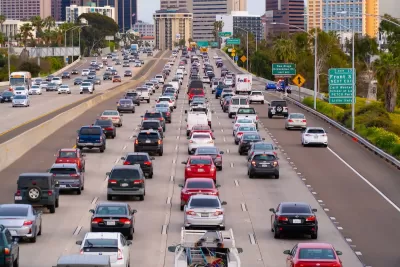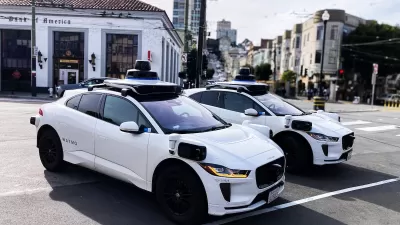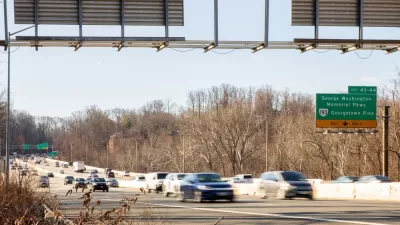The argument that car-centric development is good because it boosts national GDP ignores the massive costs of driving to everyday Americans.

In an opinion piece in Streetsblog USA, Andy Boenau argues that the link between more driving and higher GDP isn’t necessarily a good thing.
According to Boenau, the argument that GDP rises with VMT is “used in lazy attempts to prove road expansions for motor vehicles are necessarily good while traffic calming, road diets, bike lanes, transit lanes, etc. are bad. I do think the VMT/GDP overlay is an interesting talking point, but not in the way it’s generally spun by my fellow keyboard warriors.”
Boenau acknowledges that cars have greatly expanded our reach and opened up access to jobs and economic opportunities. In fact, if you take a simplistic perspective, sprawl is ‘good’ for GDP because it drives spending on roads, cars, fuel, and other related expenses. “VMT rises out of necessity, not as a marker of genuine growth or wealth.”
However, “GDP doesn't tell the dirty details of the car-dependent lifestyle most of America is burdened with.”
You might look at our soaring VMT trend as a reflection of disastrous land use and housing regulations rather than a direct sign of progress.
Boenau points to the high cost of car crashes for the U.S. healthcare system. According to the National Highway Traffic Safety Administration (NHTSA), motor vehicle crashes cost Americans roughly $340 billion in 2019 — costs that count as part of our GDP but are by no measure a positive thing for Americans. Beyond VMT and GDP, Boenau urges the reader to “Look at sedentary lifestyles, physical activity, heart disease, obesity, chronic illness, depression, anxiety. Look at the costs of each family having to be a fleet operator.”
FULL STORY: Opinion: Yes, the GDP Rises When We Drive More. But That Isn’t A Good Thing.

Maui's Vacation Rental Debate Turns Ugly
Verbal attacks, misinformation campaigns and fistfights plague a high-stakes debate to convert thousands of vacation rentals into long-term housing.

Planetizen Federal Action Tracker
A weekly monitor of how Trump’s orders and actions are impacting planners and planning in America.

In Urban Planning, AI Prompting Could be the New Design Thinking
Creativity has long been key to great urban design. What if we see AI as our new creative partner?

King County Supportive Housing Program Offers Hope for Unhoused Residents
The county is taking a ‘Housing First’ approach that prioritizes getting people into housing, then offering wraparound supportive services.

Researchers Use AI to Get Clearer Picture of US Housing
Analysts are using artificial intelligence to supercharge their research by allowing them to comb through data faster. Though these AI tools can be error prone, they save time and housing researchers are optimistic about the future.

Making Shared Micromobility More Inclusive
Cities and shared mobility system operators can do more to include people with disabilities in planning and operations, per a new report.
Urban Design for Planners 1: Software Tools
This six-course series explores essential urban design concepts using open source software and equips planners with the tools they need to participate fully in the urban design process.
Planning for Universal Design
Learn the tools for implementing Universal Design in planning regulations.
planning NEXT
Appalachian Highlands Housing Partners
Mpact (founded as Rail~Volution)
City of Camden Redevelopment Agency
City of Astoria
City of Portland
City of Laramie





























